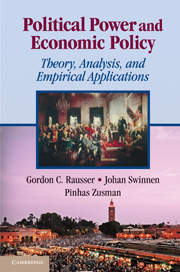Book contents
- Frontmatter
- Contents
- List of Figures
- List of Tables
- Preface
- PART 1 POLITICAL POWER AND ECONOMIC ANALYSIS
- PART 2 IDEOLOGY, PRESCRIPTION, AND POLITICAL POWER COEFFICIENTS
- PART 3 ANALYSIS OF SPECIFIC STRUCTURES
- PART 4 EMPIRICAL APPLICATIONS OF POLITICAL POWER ESTIMATION
- 20 Political Econometrics
- 21 The Political Econometrics of the Israeli Dairy Industry
- 22 Flexible Policy Instruments Given a Political-Power Distribution
- 23 Estimating Statistical Properties of Power Weight Parameters and Their Temporal Shifts
- 24 The Role of Institutions in the Joint Determination of PERTs and PESTs
- References
- Index
20 - Political Econometrics
Published online by Cambridge University Press: 05 June 2012
- Frontmatter
- Contents
- List of Figures
- List of Tables
- Preface
- PART 1 POLITICAL POWER AND ECONOMIC ANALYSIS
- PART 2 IDEOLOGY, PRESCRIPTION, AND POLITICAL POWER COEFFICIENTS
- PART 3 ANALYSIS OF SPECIFIC STRUCTURES
- PART 4 EMPIRICAL APPLICATIONS OF POLITICAL POWER ESTIMATION
- 20 Political Econometrics
- 21 The Political Econometrics of the Israeli Dairy Industry
- 22 Flexible Policy Instruments Given a Political-Power Distribution
- 23 Estimating Statistical Properties of Power Weight Parameters and Their Temporal Shifts
- 24 The Role of Institutions in the Joint Determination of PERTs and PESTs
- References
- Index
Summary
Introduction
In this chapter, we examine the issue of validation, specifically the predictive properties of our political-economic theory. To be validated, a theory must be corroborated; that is, it has to successfully pass stringent falsification tests in which the behavioral implications of the theory are compared to observed behavior. A theory must be refutable in principle; namely, if it doesn't imply behavioral patterns comparable to observed behavior, it should be rejected. A principal motivation of developing the theory is to provide a general explanation of the workings of a political economy. Because the key concepts of the political-economic theory (the strength of power and the cost of power functions) are essentially non-observable, the refutability of the theory is not evident prima facie. Accordingly, the purpose of this chapter is to demonstrate how the relevant hypotheses may be tested. This is especially important because the core elements of theory are based on many strong a priori specifications. The a priori specifications are not freely selected, and, in order to be acceptable, the specifications must conform to established social theories and the researcher's subjective beliefs, many of which are shared by the relevant research community at large. Yet although quite stringent, this requirement does not provide air-tight safeguards against false specifications.
In assessing the validity of the theory, amechanism is needed that predicts the values of the endogenous economic variables and the policy instruments for given environments.
- Type
- Chapter
- Information
- Political Power and Economic PolicyTheory, Analysis, and Empirical Applications, pp. 393 - 410Publisher: Cambridge University PressPrint publication year: 2011



